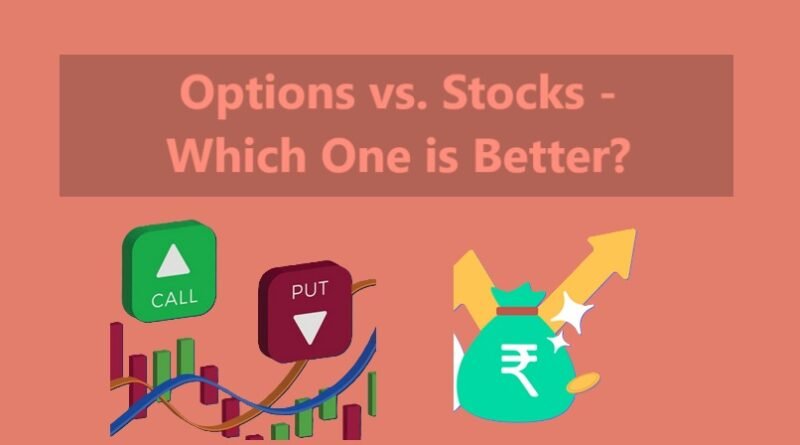Options vs. Stocks – Which One is Better?
Investing in the financial markets has always been a lucrative way to grow wealth. Two popular choices among investors are stocks and options, each offering distinct benefits and risks. Deciding which one is better depends largely on an investor’s goals, risk tolerance, and investment strategy. In this article, we’ll delve into the differences between options and stocks, highlighting the advantages and disadvantages of each.
What are Stocks?
A stock represents a share in the ownership of a company. When you buy a stock, you essentially become a part-owner of the company, with rights to a portion of its earnings and voting rights in certain cases. Stocks are typically traded on exchanges such as the New York Stock Exchange (NYSE) or NASDAQ.
Advantages of Stocks
- 📈 Simplicity: Buying and selling stocks is straightforward. You simply purchase shares of a company and hold them for an extended period, hoping the value appreciates.
- 💰 Dividends: Many stocks offer dividends, which can provide a steady stream of income for investors, especially those focused on long-term wealth-building.
- 🏅 Ownership: Stockholders are owners of the company, meaning they can vote on important matters such as mergers, acquisitions, or electing the board of directors.
Disadvantages of Stocks
- 🚨 Market Volatility: Stock prices can be highly volatile, influenced by market sentiment, economic conditions, and company performance.
- 📉 Potential for Loss: If the company underperforms or faces a crisis, stockholders can lose the value of their investment.
- ⏳ Long-Term Investment: Stocks are typically more suited for long-term investors. Short-term gains are harder to predict and often come with higher risk.
What are Options?
An option is a financial derivative that gives the buyer the right (but not the obligation) to buy or sell an underlying asset (such as a stock) at a predetermined price before a certain expiration date. There are two types of options:
- Call Options: Provide the right to buy the underlying asset.
- Put Options: Provide the right to sell the underlying asset.
Advantages of Options
- 🚀 Leverage: Options allow you to control a large number of shares for a relatively small investment, increasing potential returns.
- ⏱ Flexibility: Options provide the opportunity to profit in different market conditions, including both rising and falling markets.
- 🛡️ Risk Management: Investors use options for hedging their stock investments, helping to mitigate risks in volatile markets.
Disadvantages of Options
- 💥 Time Sensitivity: Options come with expiration dates, and if the price of the underlying asset doesn’t move as expected before the option expires, the entire investment can be lost.
- 💸 Complexity: Understanding options can be difficult for beginners. It requires knowledge of strategies like covered calls, spreads, and straddles.
- ⚠️ Higher Risk: Due to their leveraged nature, options can result in significant losses, especially for those who do not fully understand the risks involved.
Comparing Options and Stocks
Now that we’ve outlined the key differences between stocks and options, let’s dive deeper into a head-to-head comparison.
1. Risk and Reward
- 💡 Stocks tend to offer more stability but with moderate returns over time. Long-term investors can benefit from gradual growth and dividends.
- 💥 Options, on the other hand, offer a higher potential for reward in a shorter time frame but come with significantly higher risk due to their time sensitivity and complexity.
2. Complexity
- 🧠 Stocks are straightforward and easy for most investors to understand, making them suitable for beginners.
- 🧩 Options require a greater level of knowledge and experience, as investors need to understand various strategies to mitigate risk and maximize profits.
3. Market Sentiment and Timing
- 🕰 Stocks tend to perform well over the long term, driven by company fundamentals, market conditions, and overall economic health.
- 📅 Options depend heavily on timing. They provide an opportunity for substantial profits, but only if the market moves in the direction the investor predicts within a limited time frame.
4. Liquidity
- 💹 Stocks generally offer high liquidity, with most major stocks traded in large volumes.
- 💲 Options can be less liquid than stocks, especially when trading options on lesser-known assets or with distant expiration dates.
Which One Should You Choose?
When to Choose Stocks
- ✅ You prefer a long-term investment strategy.
- ✅ You want to own a piece of a company and potentially receive dividends.
- ✅ You seek a more stable and less risky investment option.
When to Choose Options
- ✅ You’re looking for short-term profits and are willing to take on higher risk.
- ✅ You want to hedge your stock portfolio or speculate on specific market movements.
- ✅ You’re experienced in trading and understand the complexities of options.
Conclusion
Ultimately, the choice between options and stocks depends on your investment goals, risk tolerance, and experience level. Stocks are ideal for long-term investors who value stability and steady growth, while options cater to those willing to take on more risk for the potential of higher short-term gains. By understanding the benefits and risks of each, you can make an informed decision that aligns with your financial objectives.

